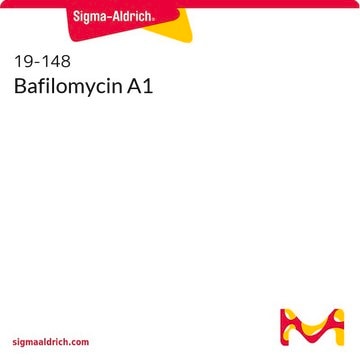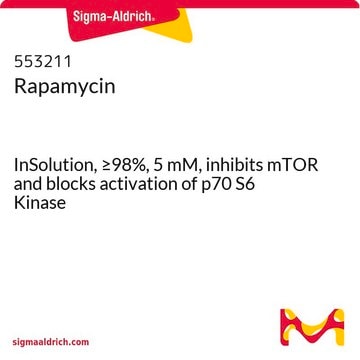SML1661
Bafilomycin A1
from Streptomyces griseus, ≥90% (HPLC), DMSO solution, V-ATPase inhibitor
Synonym(s):
BafA1
About This Item
Recommended Products
product name
Bafilomycin A1 Ready Made Solution, 0.16 mM in DMSO, from Streptomyces griseus
biological source
Streptomyces griseus
Quality Level
form
DMSO solution
concentration
0.16 mM in DMSO
shipped in
dry ice
storage temp.
−20°C
InChI
1S/C35H58O9/c1-19(2)32-24(7)27(36)18-35(40,44-32)26(9)31(38)25(8)33-28(41-10)14-12-13-20(3)15-22(5)30(37)23(6)16-21(4)17-29(42-11)34(39)43-33/h12-14,16-17,19,22-28,30-33,36-38,40H,15,18H2,1-11H3/b14-12+,20-13+,21-16+,29-17-/t22-,23+,24-,25-,26-,27+,28-,30-,31+,32+,33+,35+/m0/s1
InChI key
XDHNQDDQEHDUTM-JQWOJBOSSA-N
General description
Application
- as an endosome acidification inhibitor to study the importance of endosome acidification in the extracellular vesicle uptake and cytosolic release of stably expressing NanoLuc luciferase-tagged Hsp70 (NLuc-Hsp70) in HeLa cells
- as a vacuolar-type H+-ATPase (V-ATPase) inhibitor to study its effects on autophagic turnover of light chain 3 β (LC3-II) in mice
- as an autophagy inhibitor to study its effects on primary rat liver sinusoidal endothelial cells (LSECs) defenestration
Biochem/physiol Actions
Other Notes
Storage Class Code
10 - Combustible liquids
WGK
WGK 1
Flash Point(F)
188.6 °F - closed cup
Flash Point(C)
87 °C - closed cup
Certificates of Analysis (COA)
Search for Certificates of Analysis (COA) by entering the products Lot/Batch Number. Lot and Batch Numbers can be found on a product’s label following the words ‘Lot’ or ‘Batch’.
Already Own This Product?
Find documentation for the products that you have recently purchased in the Document Library.
Customers Also Viewed
Our team of scientists has experience in all areas of research including Life Science, Material Science, Chemical Synthesis, Chromatography, Analytical and many others.
Contact Technical Service













